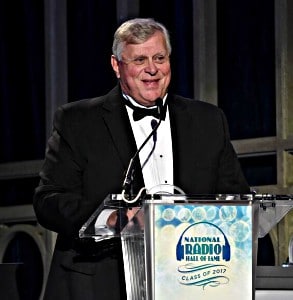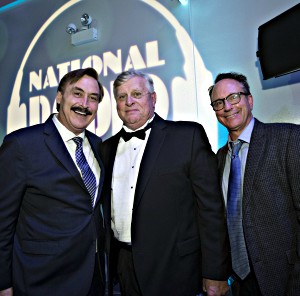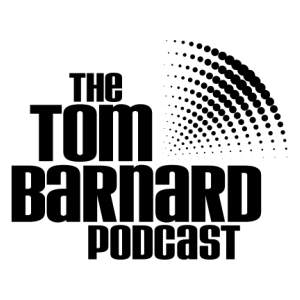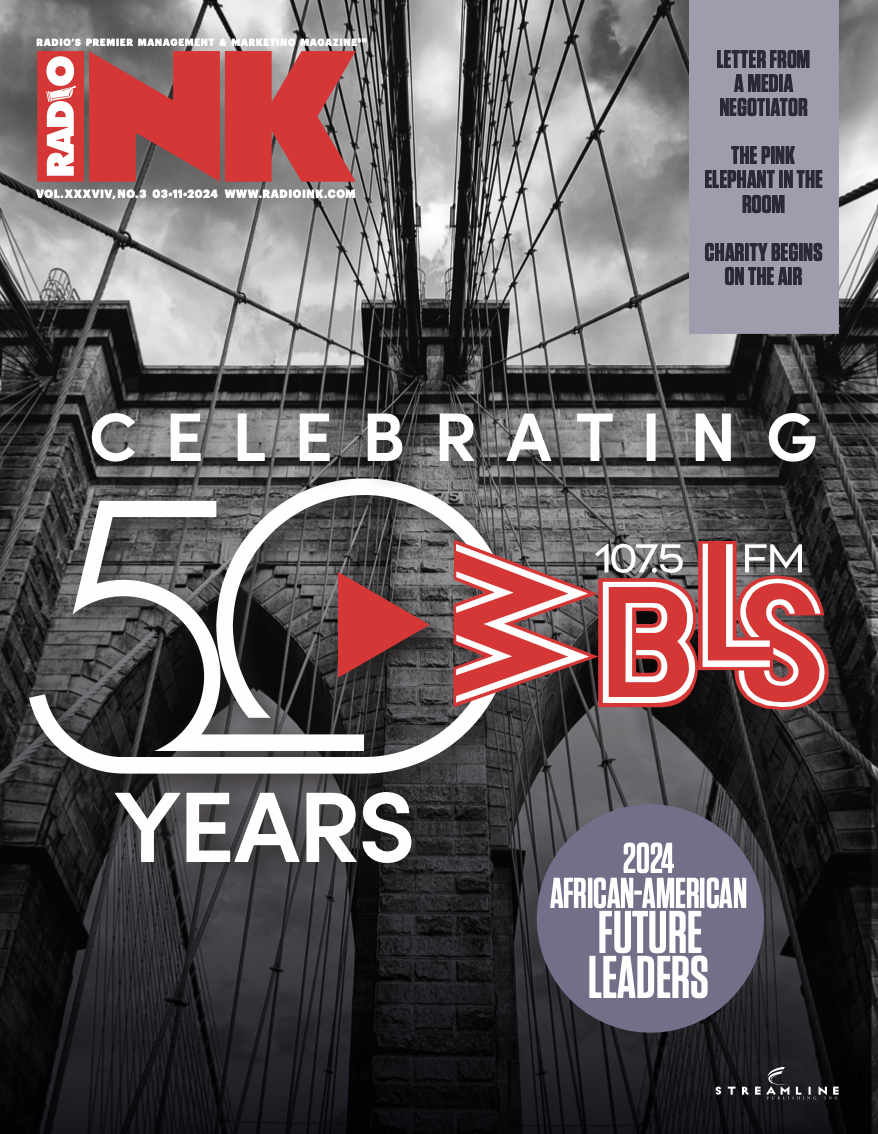
KQRS MORNING MAN TOM BARNARD
Tom Barnard grew up with six brothers and sisters in Minneapolis, in a poor neighborhood with a high crime rate. He quit high school because he had to get a job to help his family. Later, he went to college for one day and quit because he couldn’t find a place to park.
While attending a program that talks to poor kids about their ambitions in life, the topic of broadcasting came up. Through that program, Barnard went to Brown Institute — and he was thrown out, seven times. Luckily, he made it through the program eventually and was told about a job opening at a 500-watt daytimer. He took the job nobody else wanted at Country station KDAN-AM. “I don’t sound country. I have a very urban edge to the tone of my voice. I did not fit the format, and the listeners let me know that. It got very racial. They thought I was black and did not like that back in the ’70s.”
Barnard decided KDAN was not for him and moved to Grand Forks, North Dakota, where he says he couldn’t understand anything the locals were saying because of their long o’s. He was doing nights at KNOX/Grand Forks when he heard Chuck Knapp had taken the morning gig at KTSP in Minnesota, which went from a Talk station to a Rock station and from 13th to second place in 92 days.
He kept calling the station until they offered him a job engineering what used to be called the “Jesus tapes” on Sunday morning. And one day he got a call at 1:30 a.m. because the overnight guy didn’t show up. Eventually Barnard took over that shift, got moved to middays, then up to mornings.
“The station was on fire, but I was 20 years old and I thought I was a big deal because I’d had a 19 share at night. So I thought I should go across the street because I could make more money. I went across the street and got killed.”
Barnard says that was the best thing that ever happened to him. “I realized it is not all about you, no matter how good your ratings are. Even though I was in the same town, at the same time, I could not bring my audience with me.” He got fired.
Barnard moved to Jacksonville in 1977 to work at WAPE before returning to Minneapolis to work at Capitol Records for five years. He also did some voiceover work and was traveling a lot to Chicago and New York City, where he actually had an apartment. When his wife called from Minneapolis to let him know his second child was on the way, he wondered if they would be able to raise another child with him living so much in New York. The next call he would receive changed his life, and Minneapolis radio, for decades to come.
It was Dave Hamilton, the PD at KQRS, who called to ask Tom if he wanted to get back into radio. “I said, ‘Why?’ He said, ‘We have a morning opening that I would like to talk to you about.’ I said I’d been told my entire life I could never do morning drive. He said, ‘I don’t think that is true.’” Tom Barnard started hosting mornings at KQRS on April 17, 1986, and to this day he dominates in the ratings.
“I ripped the sports teams for about a year,” he says. “I found this out later, but at the time, the GM said everyone hated me, ‘We have to get rid of him.’ Dave said, ‘Let’s wait until the first ratings come out, and if they aren’t good, we’ll get rid of him.’ Ninety days later we went from a 5 to a 9.5. Because of Dave Hamilton, I have a career as a morning guy. And it kept getting better and better. It’s been 32 years, which is unbelievable. I have had a lot of people believe in me.”
Five years ago, Tom Barnard launched a podcast that he hosts with his family. He’s been taking it out to the road and getting it aired on small-market stations outside of Minneapolis, and he hopes to be on over 100 stations in five years. He sells his own spots, and says the podcast is downloaded 400,000 times per month. He also says he’s making half a million dollars a year from the podcast.
Tom Barnard may be remembered as the most successful host in the history of Minneapolis-St. Paul. He was inducted into the National Radio Hall of Fame in 2017 and has a Marconi on his shelf. He’s also become one of the most successful podcasters in radio.
Radio Ink: How have you dominated on the radio in Minneapolis for so long?
Barnard: I take a completely different approach to radio than most people, especially in this market. For example, another accusation came in against Al Franken. I went on the air and said this is the sixth woman that has accused him of trying to force himself on her, but, “Ladies and gentlemen, I don’t like Al Franken and I’ve never liked him. I’ve interviewed him many times. I think he’s a flaming prick, so I can’t make a judgment call here. I can’t say if he’s guilty or not. I can’t take a stance on this.”
If I don’t take a stance, I explain why, and people really like that. Even though I can’t stand him, I’m not going on the air and ripping into him because I don’t know if he’s guilty. I assume these six women are telling the truth. It would be too easy to rip him and say we should burn him at the stake.
The show is also very pro-women. I was raised by my mother and my two older sisters. I like strong women and talk about them a lot. That is unusual, from what I understand. I grew up in a different way than 99.9 percent of people in Minnesota, and they kind of like that. It is a different perspective, I guess.
Radio Ink: Did you ever get calls to move to a larger market?
Barnard: I literally got a call from every market in the U.S. — I got a lot of calls. One of the big reasons I didn’t go was because we bought a farm, and I had another child two years later. I wanted to raise my kids there. My mother was getting older, and I wanted to stay by her as long as I could. I was basically a mama’s boy; I did not want to leave her side. And we had a 29 share in the morning.
So I said to myself, “Do you think you can do that well anywhere else?” Maybe, maybe not. There have been great successes that have tried other places and it just doesn’t work, and that may have been it for me too. They were taking care of me pretty well financially, so I had no reason to move. I really liked it.
I’m a very private person. I don’t go out in public very often. Unless I open my mouth, people don’t know who I am. It’s been too good a life. I did find later that a few of the owners — we have been through six — wanted to syndicate the show nationally and the local management turned them down and never even told me about it, which I’m not too happy about. I would have liked to try it.
Is it something I am livid about? No. The people have been wonderful to me and my family. My wife is from here. I have two grown children and one grandchild. I have been very fortunate.
Radio Ink: You were kicked out of high school, and out of the Brown Institute

seven times, and in 2006 you won a Marconi. That’s pretty incredible.
Barnard: It’s very humbling. We’re the 15th market; it’s a large market but not a major market, so that was very nice. The Radio National Hall of Fame this year was really odd. I go in and I see Groucho Marx and FDR and I’m thinking what the hell am I doing here? Stanley Hubbard Sr. and Garrison Keillor are in. I did joke on stage and said the only difference between Stanley Hubbard, Garrison Keillor, and me is I had to get ratings. About half the people did not think that was funny. I actually worked for Stanley Hubbard Sr; he was still in charge when I went to work there in 1971. I met Garrison one time. Not my kind of guy, but I’m sure I’m not his either.
I’m a big guy, I used to be a power lifter, and I tell people what it was like when, year after year, we had anywhere from a 25-29 share in the morning. When we got up to a 29 share, I went home and sat on the floor and started crying. My wife asked what was wrong. I said, “What am I gonna do now?” I was terrified. Once you’ve reached this peak, if everything collapses, it’s really gonna hurt. Luckily, it hasn’t.
I mean, last month we had a 15 share, which is still phenomenal. I’m not going to scoff at a 15 share in Minneapolis-St. Paul. I’ve been lucky to work with some great people. I’ve worked with a couple of morons that I hated, but I suppose everybody goes through it.
Radio Ink: How did the podcast get started? You have your entire family doing the show with you.
Barnard: Family is very important to me. I come from a family of seven kids. We have a son and a daughter who live in the area, and we spend a lot of time together on the podcast. I talked to John Dickey about six years ago and said the future in radio for small and medium markets is going to be digital. The only way to exist in the future is if you use digital programming that doesn’t cost anything.
For years I talked to people, and nobody knew what I was talking about. They said, “Well, podcasting is podcasting and terrestrial is terrestrial.” So I started doing the podcast with my family. I’m competing against myself, because the KQ morning show is there and then the KQ morning podcast is also on, and I have my own personal podcast.
I went out and started getting affiliates for the podcast. Managers asked me how it would work. Would it be live? I said no. I do three hours a day, and we cut up each hour into 15-minute segments. We upload it so you can download it and put the segments in any order you wish. The only thing I need is three minutes an hour in advertising, which they were not selling anyway.
We started in St. Cloud, then Brainerd, and I just got back from a road trip and it looks like we are going to pick up four more affiliates. I’m focusing on Minnesota, western Wisconsin, northern Iowa, and the Dakotas. We’re going to get our fourth, fifth, sixth affiliates after the first of the year. It doesn’t cost them anything; they download it for free and put it on the air. I sell the three minutes an hour, which, again, they were not selling anyway. It works for everyone.
It’s now doing 400,000 downloads a month, which is not big for a podcast. It is big enough for me, and it’s not going to get much bigger. I was at PodcastOne for a year, but nobody knew who I was. I have a friend at PodcastOne who does Darkness Radio, and he gets 42 million downloads talking about true crime, etc. If I am ever going to build this into a big podcast where eventually people across the country will listen, I am going to have to spiral it out from Minneapolis-St. Paul, and that’s why St. Cloud came first and then Brainerd, which is about 120 miles away.
Mostly I wanted to go into college towns, which is also good for the KQ morning show. In general the people who go to Mancato State, or the University of Minnesota at Duluth or the University of North Dakota, they are going to end up moving to Minneapolis and then say, “Hey, that’s the guy I used to listen to on my hometown station,” so it will be good for KQRS. It has been already.

Radio Ink: Are you driving around making these calls on the radio stations yourself to sell the podcast?
Barnard: I’ve talked to all these people myself. [KQRS PD and Cumulus VP of Classic Rock] Scott Jamison is very helpful and says to do this or that. My wife and I like to drive around the state for recreation and we tended to go to Duluth, Fargo, Mancato, and Red Wing, so I was going there anyway.
Radio Ink: What is the podcast about?
Barnard: There’s a lot of family talk. We do cover the topics of the day. Politically, I’m a centrist, which means I hate everybody. I’m not a big fan of politicians. I watch news every night, whether it’s CNN or Fox, and nobody can see any of the other side’s viewpoint at all. You are 100 percent against that person’s viewpoint. It seems to be very insincere.
That has helped me to get affiliates. People in the radio business are getting sick of political radio. You can’t compliment a person from another party, you hate them and everything they say. I mean it is ridiculous.
Radio Ink: How do you get your family involved in the discussion?
Barnard: We talk a lot about what’s going on in our lives. My wife and I are close, but we can take a lot of shots at each other. I admire strong women, and my wife is a strong woman. People think it’s funny when she says, “Calm down, you don’t know what you’re talking about.”
Radio Ink: Are you making money with the podcast?
Barnard: Yes. I’m lucky in that I have a lot of big supporters and the demographics are good. It makes about a half a million dollars a year already. I would not have known what to do had I not been lucky enough to work in the record business when I was younger. I will not endorse somebody or any product I don’t believe in. There is great value for the advertisers. They know I won’t lie to make money. I don’t need to.
Radio Ink: You’re going on the sales calls yourself?
Barnard: Absolutely; I do it for the radio station and the podcast. Mike Lindell from the company My Pillow is a friend. He, and all my major advertisers, were nice enough to come to my Hall of Fame celebration in Chicago. It was unbelievable. It’s not because I suck up to them. I treat them like human beings. Mike flew us down on his private jet. We have a great relationship.
Radio Ink: It’s interesting that you can do the afternoon podcast, make the sales  calls, and have your morning radio job. How do you make that work?
calls, and have your morning radio job. How do you make that work?
Barnard: I literally work 14-16 hours a day. I wake up at 3 a.m. to plan the day. I don’t do show prep for either the radio show or the podcast. I like to ad lib. I barely read the news before I go on in the morning. I don’t pre-read the news. Both shows are ad-libbed completely.
Radio Ink: What advice do you have for other hosts to make sure their career is solid so they are not sitting against the wall crying like you were?
Barnard: Morning and Talk radio will always exist. For it to survive, hosts need to get involved in podcasting and put their content out there. There are thousands of stations, and they need content. Content is expensive.
When I started this, people asked me how much I was going to make. Well, at $10 a spot, that would be $20,000 a year. They said, “Why even bother?” and I said, “Because if I’m on 100 radio stations, that’s $2 million a year.” It’s a great way for announcers to make money. It’s a great way to keep radio alive. I do believe it will all end up being digital because it is cost-effective.
Radio Ink: Five years from now, where do you think your podcast will be?
Barnard: I would think it will be on 120-140 radio stations. I cannot sit still. On Thanksgiving night, I said, “What am I going to do for the next three days?” I have to have something to do. Most of my life is talking. I think that’s one of the reasons my family agreed to do the podcast — so they didn’t have to hear me yammering constantly at them.
It makes me very happy. I will pretty much have Minnesota covered by next year and then look at moving deeper into the Midwest, further southwest and east. At some point I’m sure Cumulus will put me on their stations, when they feel they are ready. I will do the KQ morning show as long as it works. I’m never going to retire because I don’t really work.
Radio Ink: Do you think there will be a syndication deal at some point?
Barnard: I don’t know if I would want to do that because we would probably have to change the morning show a lot to be nationally syndicated. The podcast is not just about Minnesota, it’s about everything. A few weeks ago someone called complaining, and he was in the armed forces in Qatar. They blocked my podcast, and he was upset about that. I never thought I would be getting calls from around the world about a show I do. I never thought I would get a call from you to do this story, or a Marconi or the Hall of Fame. It’s an honor.






Moved back after 20+ years away. Glad that Mr. Tom B. is still part of the scene. His ad-lib style and honest commentary is one of kind – none better!
Congrats Mr. B., job well done – a Minnesota treasure for sure.
James I. Laursen
Listened for years….decades actually. Lost interest when Teri left. Yep…she was dingy…and nice…and imperfect….that’s why she was interesting. She was exactly like so many rural Minnesotans many of us grew up with. Loved when Tom was sarcastic and mean to politicians and all the “winners” in the world. Then he turned it toward people who have no outlet to defend themselves….see ya.
Tom is a blatant asshole and is the reason myself and many, many other Minnesotans stopped listening to KQ.
Even before he started berating his co-workers on the air; his smug, self-righteous and disinterested composure was a turn off. I listened to the morning show for at least a decade. Every shop or warehouse I’ve ever worked in has had the morning show on daily, until a few years ago. Tom is a flaming prick and is absolutely terrible at interviews. Spends more time telling people how great he is than asking questions; just terrible. Now every radio I hear in shops and warehouses is tuned to the 93X half assed morning show. A half assed show is more entertaining than listening to an overpaid lunatic talk down to his co-hosts.
Actually, the guy is that good. Believe me, I would know.
Wow! This narcissistic egomaniac actually believes his own lies. Hes far from “pro-woman”, he treated his co-worker of over 30 years Terri Traen so badly, degraded her on the air, got her fired which had resulted in the loss of a huge number of very loyal listeners and didn’t bat an eye while doing it. He’s nothing but a pos!!
Meanwhile, she’s picking apples. Maybe she doesn’t have the talent – or the business savvy – that you think she has. But good try.
She actually has more talent judging by the number of listeners they lost whenTom got her fired, his jealously was obvious. Nice try though
Terri was a pleasant person on the air and had a great laugh but, face it she was a ding bat, passing along wrong info and facts all the time. When she read spots her voice would get higher and higher. With all those years you would think she could master reading spots but she never did. She drove me crazy for years and I am a female.
Fact check: The city’s name is spelled Mankato.. otherwise, well done.